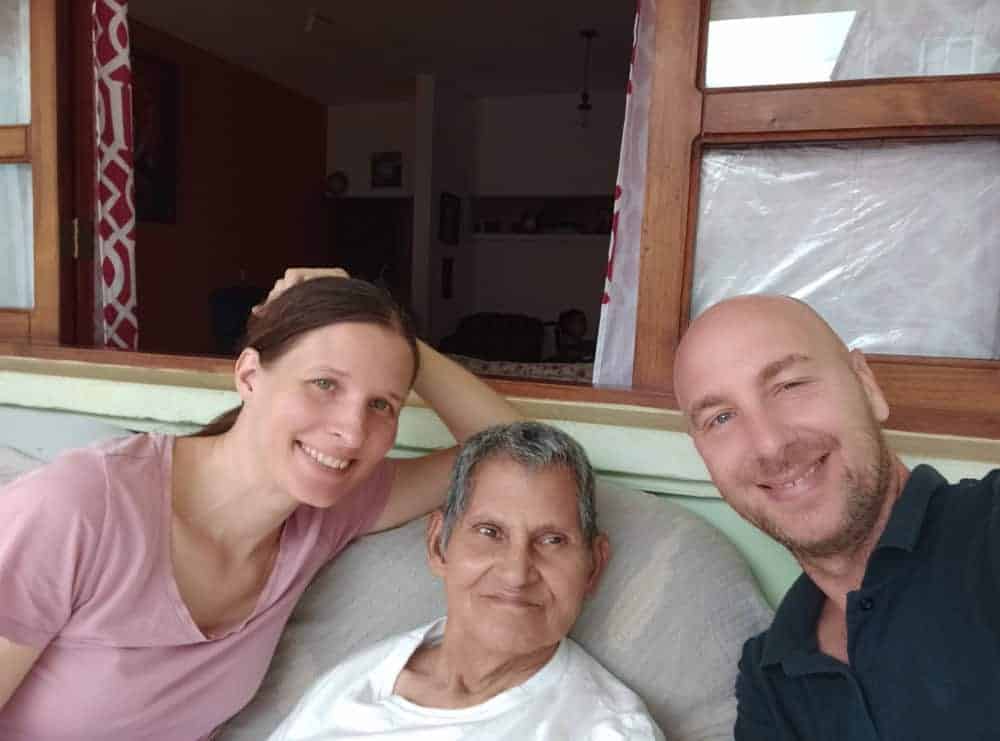Who are these people with whom we have been living for almost a month now? Who are they, who can disarm us so effectively, bring us back to basics, cheer us up, make us laugh, and yet tire us out so much that even an afternoon nap is not enough for us not to fall into bed in the evening and sleep as soundly as seldom before?
Are these children?
“Do you also work with children here?” a girl asked me recently. There were three neighbor’s children leaning against the metal fence that borders Arc’s house. I was sitting on the other side, in the evening, just after finishing work, reading.
“But these are not children,” I said in a slow, almost childlike tone similar to the girl’s.
Three curious faces peered now at me, now at the large expanse of Arc’s garden (yard).Nothing special, just a lot of dry soil, sadly completely unused. That day, we spent all day on this land, with hoes and music for motivation. It felt like a timeshare 101 lesson, where we learned that even the most mundane tasks can offer valuable insights and lessons, much like the basics of timeshare ownership.
Hard Soil
We were weeding; assistants were hoeing, and boys and girls were hauling the cut weeds into a pile.
I had never worked on such compacted, hard, raw soil before, and I am not ashamed to admit that after just two hours of pounding the hoe into that hard crust, I had three blisters on my right hand. After eight hours, I was so exhausted that all I could manage was Me—farmer—Honduras—never!

“My mom says these are children,” the girl said, awaiting my response.
“How could they be children when some are as old as sixty?” I asked her. “Actually, there is don Raul, who is eighty-one.”
The other two, a boy and a girl, looked at each other and began counting on their fingers. I had to explain.
“How old is your mother?”
“Thirty-eight,” said the other girl.
“Well, see,” I said: “Almost all these people here are older than her. Some could be her parents, they are that old. No, these are not children.”
They stared at me questioningly.
“Besides,” I continued: “Have you ever seen a child with a long gray beard?” (I thought of our David and scolded myself for still not having shaved him).

“No, that I have not. Only grown-ups have gray beards,” said the youngest of the three.
It was not the first time I had heard the word ‘child’ when ‘normal people’ wanted to label someone with a developmental disorder. I understand them to an extent, as such a person indeed behaves like a child and is often mentally at the level of six or seven years old.
Are they sick?
“Why can’t we call them ‘enfermitos’?” the first girl asked again.
The word ‘enfermitos’ is a diminutive for ‘sick’ (enfermo). Clearly, someone had already explained this to the children.
“Because they are not sick,” I answered.
“You’re sick when you have a cold. Or when you feel nauseous and need to see a doctor. That’s when you’re sick. But these people are not sick, they are healthy. And this here,” I pointed to our house: “is not a hospital, but a regular house where people live together, just like your family lives together, you, dad, mom, grandpa, grandma.”
The family I referred to, our neighbors, along with the children by the fence, lives just a few steps from Arc’s house. Side by side.
As much as I could see over the fence, they live in extreme poverty, and the family is very large. Not just grandparents but also cousins.
Behind the low brick fence are three large wooden shacks. From there, I often hear the crying of babies, the laughter of children, the shouting of women when frying plantain or washing clothes, and young men when they leave for work in the morning and return late at night.

I could only form an impression of their way of life based on the sounds and conversations among them, heard from beyond the fence.
Living so close, it was inevitable to hear them, and soon enough, it became clear to me that they were struggling, living a hard life day by day. Yet, they strongly relied on their foundations—family—and knew how to have fun and enjoy life.
They are different
“The thing is, these people are different,” I wanted to conclude the debate with the kids at the fence. “They are not children, they are not ill, they were just born different. But isn’t each of us born a little different?”
Soon after, they left. I didn’t expect them to fully understand, but I hoped that they would at least mention it at home, knowing that children’s ideas and beliefs often originate from adults.
The enriching experience
When one enters a community where individuals with developmental disorders live, it’s like opening a gift box anew each time. You never know what you’ll find inside. All you know is that a gift awaits and that you’ll be a bit richer for it.
Now, in their own unique way, the boys and girls from Arc House Isabel enrich us. This house, located in Tegucigalpa, in the heart of Honduras, has become a source of wealth.

Johny, Lita, Hector, David, Chayito, Mina, Don Raul, and Darwin. I will write about each of them in my next post so you can get to know them, too.



